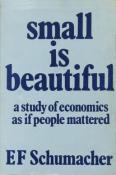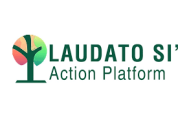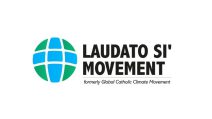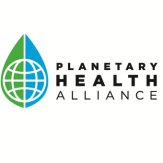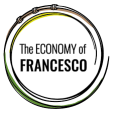New Economy - 10 Innovative Approaches
Here you will find a small collection of approaches for the new economic thinking of the last years to build a Economy of Francesco.
1. The Economy for the Common Good
Economy for the Common Good is a social movement advocating for an alternative economic model. It calls for working towards the common good and cooperation as value above profit-orientation and competition[1] which leads to greed and uncontrolled growth. The common good balance sheet shows the extent to which a company abides by values like human dignity, solidarity and economic sustainability,
2. Social Solidarity Economy
The Social Solidarity Economy is an alternative to capitalism and other authoritarian, state- dominated economic systems. In SSE ordinary people play an active role in shaping all of the dimensions of human life: economic, social, cultural, political, and environmental. SSE exists in all sectors of the economy production, finance, distribution, exchange, consumption and governance. It also aims to transform the social and economic system that includes public, private and third sectors. SSE is not only about the poor, but strives to overcome inequalities, which includes all classes of society. SSE has the ability to take the best practices that exist in our present system (such as efficiency, use of technology and knowledge) and transform them to serve the welfare of the community based on different values and goals.
3. Ecological Economics
By treating the economy as a subsystem of Earth's larger ecosystem, and by emphasizing the preservation of natural capital, the field of ecological economics is differentiated from environmental economics, which is the mainstream economic analysis of the environment.
"Ecological economics exists because a hundred years of disciplinary specialization in scientific inquiry has left us unable to understand or to manage the interactions between the human and environmental components of our world. While none would dispute the insights that disciplinary specialization has brought, many now recognize that it has also turned out to be our Achilles heel. In an interconnected evolving world, reductionist science has pushed out the envelope of knowledge in many different directions, but it has left us bereft of ideas as to how to formulate and solve problems that stem from the interactions between humans and the natural world. How is human behavior connected to changes in hydrological, nutrient or carbon cycles? What are the feedbacks between the social and natural systems, and how do these influence the services we get from ecosystems? Ecological economics as a field attempts to answer questions such as these." (Source: The International Society for Ecological Economics)
4. A New Economics for Planetary Health
In calling to mind the figure of Saint Francis of Assisi, we come to realize that a healthy relationship with creation is one dimension of overall personal conversion, which entails the recognition of our errors, sins, faults and failures, and leads to heartfelt repentance and desire to change (Laudato Si 218").
Planetary health has been defined as “the health of human civilization and the state of the natural systems on which it depends”.
The Planetary Health Alliance (PHA) is a consortium of universities, NGOs and other partners with a shared mission—supporting the growth of a rigorous, policy-focused, transdisciplinary field of applied research aimed at understanding and addressing the human health implications of accelerating anthropogenic change in the structure and function of Earth’s natural systems.
H. Frumkin, S. Myers. Planetary Health: Protecting Nature to Protect Ourselves (536 pages, August 2020)
W. Evision, S. Bickersteth. A New Economics for Planetary Health. In: Planetary Health: Protecting Nature to Protect Ourselves (536 pages, August 2020)
5. Integrative Economic Ethics
Integrative business ethics is a theory of how economic action can be integrated into a general ethical conception of human action.
Integrative Business Ethics was developed by Peter Ulrich, who was Director at the Institute of Business Ethics at the University of St. Gallen from 1989 to 2009. Instead of an increasingly dominant economic rationale in modern times, he calls for a justification for economic activity that is primarily oriented towards the usefulness of life.
As tasks of the Integrative Business Ethics Ulrich mentions
- Critique of "pure" economic reason
- Determination of socio-economic rationality
- Description of the public discourse as the principal "place" of morality.
The critical approach should show that normativity is "not the "flip side" of economic rationality, but its foundation". (IWE 128) It is important to "oppose economistic foreshortening and circular reasoning" that arises from the fact that purely economic concepts of rationality represent a break in the reflection on their inner rationality. A well understood economic rationality thus becomes a "declared departure from economism within economic theory by philosophical means.
6. New Economic Thinking
Founded in the wake of the financial crisis in 2009, the Institute for New Economic Thinking (INET) is a nonpartisan, nonprofit organization devoted to developing and sharing the ideas that can repair our broken economy and create a more equal, prosperous, and just society. We need a new vision of the economy that aims to serve society. Our approach is guided by a set of key principles:
- Economists and their ideas must be independent from powerful interests. Otherwise, economics is beholden to those at the very top and fails to serve all of society.
- Complexity and uncertainty are inherent in economic and financial systems. We must question theories based upon the flawed assumption that humans always behave rationally and predictably, and that markets always trend towards equilibrium.
- Inequality and distribution matter as much to the economy as growth and productivity.
- Heterodox models that pose alternatives to the neoclassical orthodoxy are essential to understanding the economy and promoting a vibrant intellectual pluralism.
- History matters. We must learn the lessons of past mistakes, and also draw on roads not taken historically to map a more equal and prosperous future.
- Diversity of race, gender, class, and other forms of identity enrich economic thought.
- An outdated economic structure is endangering our planet—but new approaches could save it. To uncover solutions, economists must first incorporate analyses of climate change, population growth, and stressed resources into their research.
- Multidisciplinary learning. A discipline in isolation develops harmful blind spots. We collaborate with scholars in other social sciences, the humanities, and the natural sciences to better understand our world. (Source Institute for New Economic Thinking (INET))
7. Small is Beautiful - Rethinking Economics
First published in 1973, Small Is Beautiful brought Schumacher's critiques of mainstream economics to a wider audience during the 1973 energy crisis and the popularisation of the concept of globalization.[In 1995 The Times Literary Supplement ranked Small Is Beautiful among the 100 most influential books published since World War II.A further edition with commentaries was published in 1999. In 1971, Schumacher converted to the Catholic faith as an atheist who had focused on Buddhism. About his relationship to the Catholic Church before his conversion he once said: "It was a long standing illicit relationship.
He developed an interest in Buddhism, but beginning in the late-1950s, Catholicism heavily influenced his thinking. He noted the similarities between his own economic views and the teaching of papal encyclicals on socio-economic issues, from Leo XIII's "Rerum novarum" to Pope John XXIII's Mater et magistra, as well as with the distributism supported by the Catholic thinkers G. K. Chesterton, Hilaire Belloc, and Vincent McNabb. Philosophically, he absorbed much of Thomism, which provided an objective system in contrast to what he saw as the self-centered subjectivism and relativism of modern philosophy and society.He also was greatly interested in the tradition of Christian mysticism and read deeply such writers as St. Teresa of Avila and Thomas Merton. These were all interests that he shared with his friend, the Catholic writer Christopher Derrick.
Film 30 Minutes: Small Is Beautiful: Impressions of Fritz Schumacher
8. Towards a new Eco-Social World Economy
The paper deals with the issue of whether a sustainable future for humankind can be reached or not. If not, human existence would not come to an end, but the quality of existence would considerably deteriorate. For many reasons, it is not easy to get onto a sustainable track. Doing so will require the equivalent of surgery on a “living body”. And many powerful vested interests are in the way. If success can at all be achieved, it will require considerable changes in global governance. The restricted quality of global governance today is a key deficit of the world we live in today. The author was often asked, what system of global governance rules for the world to implement, if one had the power to do so. The paper gives the answer to that question in the form of twelve interrelated ele
A Better Governance for a Better Futur-R[...]
PDF-Dokument [204.3 KB]
The Global Marshall Plan Initiative views itself as an integrative organizational platform for a "world in balance". Composed of a network of more than 5000 supporters from all levels of society,brought together from politics, economics and civil society, the Initiative is based on five core goals for fair globalization. Through its network-like character, it is organized through even hierarchies and without a centre. Everyone is invited to actively participate and take action with their circles and the accompanying opportunities to implement a World in Balance. The goal of the Global Marshall Plan Initiative is to establish a framework compatible with sustainability for the global economy – a global Eco-Social Market Economy.
Global_Marshall_Plan_Initiative.pdf
PDF-Dokument [580.2 KB]
9. To Have or to Be? - A new blueprint for mankind
The development of this economic system was no longer determined bythe question: What is good for Man? but by the question: What is good for the growth of the system? One tried to hide the sharpness of this conflict bymaking the assumption that what was good for the growth of the system(or even for a single big corporation) was also good for the people. Thisconstruction was bolstered by an auxiliary construction: that the veryqualities that the system required of human beings—egotism, selfishness,and greed—were innate in human nature; hence, not only the system buthuman nature itself fostered them. Societies in which egotism, selfishness,and greed did not exist were supposed to be "primitive," their inhabitants"childlike." People refused to recognize that these traits were not naturald
erich-fromm-to-have-or-to-be.pdf
PDF-Dokument [361.6 KB]
10. The Economics of Good and Devil - The Mephisto Problem
Tomáš Sedláček: Economics of Good and Evil. The Quest for Economic Meaning from Gilgamesh to Wall Street. Vorwort von Václav Havel, Oxford University Press, Oxford / New York 2011
The Mephisto Principle in our Economy (Christian Kreiß)
Applied to economic life, the Mephisto principle means that the most false and harmful basic assumptions or axioms possible must be introduced, but which at first glance appear plausible, good and reasonable. These 7 axioms are: 1. insatiability 2. compound interest is good, right and important 3. property in any amount is good, right and important 4. companies should maximize their profits 5. consumers maximize rationally their self-interest 6. competition and competition are good 7. the invisible hand of the market transfers the selfish behavior of market participants into the common good.
After its explanation, 7 chapters follow on the harmful effects of these axioms. In the following the author drafts a counter model of humane economy and describes ways to its realization. Behind the economic misdevelopment the author sees the "fight for the elimination of Christianity": Today's economic sciences are in his estimation in many areas a frontal attack on Christianity. The key sentence from Christoph Lütges "Wirtschaftsethik" serves him as proof of the unspirit of economic science:
"One can understand self-interest - within the appropriate framework - as a "modern form of charity" [...]. Thus the traditional opposition between good, altruistic behavior and bad egoism is no longer valid.
Altruism and charity, two central pillars of Christianity, according to Kreiß, would thereby be abolished.
Christian Kreiß is a German professor of economics at Aalen University. His focus is on finance and economic policy. In his non-fiction books he criticizes the premises of neoliberal economic theory and warns of its socio-political consequences.


